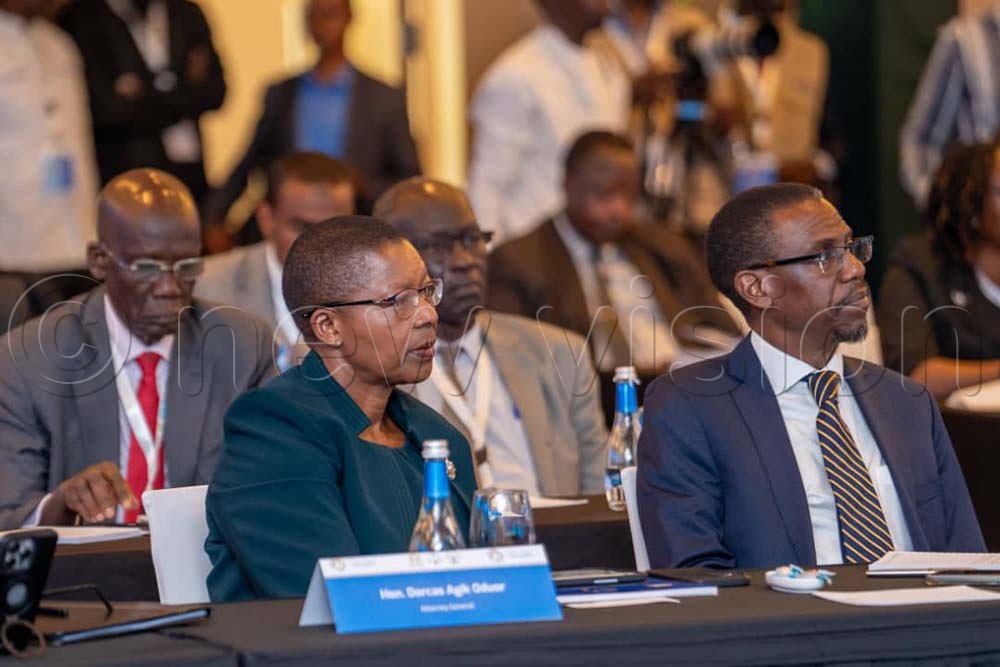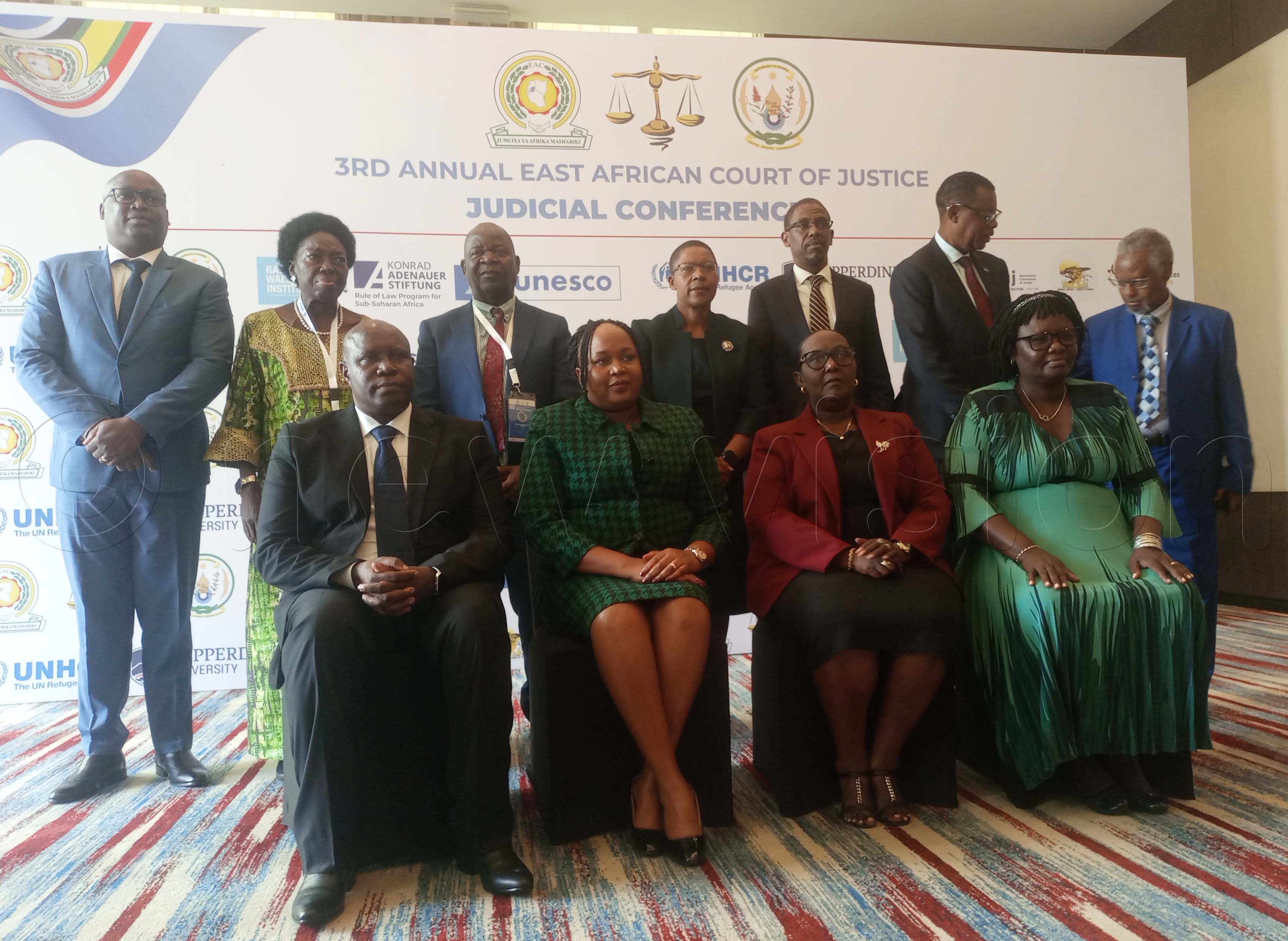'Budgetary constraints hampering EA Court of Justice'
Kayobera said because of budgetary constraints and the adhoc terms of service for the judges, over 200 cases are pending hearing and determination before the court.
East African (EA) Court of Justice judge president Nestor Kayobera (Pictured) said the budgetary constraints are exacerbated by judges of the court serving on adhoc basis. (Credit: Farooq Kasule)

NewVision Reporter
@NewVision
By Farooq Kasule
KIGALI - East African (EA) Court of Justice judge president Nestor Kayobera says the performance of the court is being hampered by budgetary constraints.
Speaking at the opening of the 3rd annual East African Court of Justice (EACJ) Judicial Conference in Kigali, Rwanda on February 18, 2025, Kayobera said the budgetary constraints are exacerbated by judges of the court serving on adhoc basis.
Kayobera said because of budgetary constraints and the adhoc terms of service for the judges, over 200 cases are pending hearing and determination before the court.
“As we speak now, we have more than 260 cases, which are still pending and the issue is that the judges are not permanent, they are serving on adhoc basis except the President and the Principal Judge who are permanent in Arusha. So, we sit only quarterly and this means four times for the First Instance Division and Four times for the Appellate Division in a year. This is therefore very little time given the number of cases that have been filed before the court that need to be looked into by the partner states,” Kayobera said.
Uganda's Attorney General Kiryowa Kiwanuka remarks at the East African Court of Justice judicial conference in Kigali, Rwanda on Tuesday, February 18, 2025. (Credit: Farooq Kasule)
Kayobera said ever since the court commenced business in November 2001 over 800 cases have been filed before it which means that the people from the EAC partner states appreciate it.
EAC partner states, include Uganda, Rwanda, Tanzania, Burundi, South Sudan, DR Congo and Somalia and each of them is supported to make an annual contribution towards the court to support its operations.
“Sometimes we postpone our sessions because of lack of funds but notwithstanding those challenges, we have tried and the performance of the court is positive,” Kayobera said.
Kayobera, however, lauded the partner states for supporting the court and enforcing its decisions noting that almost all the decisions of the court have been enforced.
Uganda’s Attorney General Kiryowa Kiwanuka was hailed for his kin interest in issues pertaining to the East African Court of Justice.

Among the Ugandans taking part in the conference include First Deputy Prime Minister and Minister for East African Affairs Rebecca Kadaga, Principal Judge Dr Flavian Zeija, Uganda Law Society (ULS) president Isaac Ssemakadde, Court of Appeal Judge Geoffrey Kiryabwire and Cheborion Barishaki, High Court Judge John Keitirima.
Kayobera said the annual conference and rotational court sessions are meant to ensure that the people understand the role of the court and its mandate because many people seem to be unaware of the jurisdiction of the court.
“When I was appointed the Judge and the President of the court on February 27, 2021, I decided that the court should not only be in Arusha, Tanzania and that we shall be rotating to partner states because it is not a court of judges but the court of the people of East Africans and they need to understand what it is this court. In November 2021 we spent one month in Bujumbura, Burundi, in 2022 we were in Kampala, Uganda and we spent 40 days there, and we are now in Kigali because this is a court for the people of EAC, Rwanda,” Kayobera said.
On who can access the court, Kayobera said any aggrieved person in the partner states can file a case before court without paying any money because the court’s services are free of charge.
Contrary to what many people think, Kayobera, an aggrieved person is not required to exhaust the local remedies in order to file a case before the court.
“Accessing this court is free of charge, it doesn’t require any fee. Secondly, accessing this court doesn’t require exhausting local remedies. However, an aggrieved person must access it within only two months,” Kayobera said.

Among the Ugandans taking part in the conference include First Deputy Prime Minister and Minister for East African Affairs Rebecca Kadaga (2nd L back row), Principal Judge Dr Flavian Zeija, Uganda Law Society (ULS) president Isaac Ssemakadde, Court of Appeal Judge Geoffrey Kiryabwire and Cheborion Barishaki, High Court Judge John Keitirima. (Credit: Farooq Kasule)
In regard to increased filing of cases before the court, Kayobera said it is a signal that people from the partner states have started appreciating its mandate.
The court’s Principal Judge Yohane Masara explained that the court is mandated to interpret matters relating to the Treaty for the Establishment of the East African Community (EAC), protocols supporting the treaty such as the East African Custom Management, common market protocol and acts of the East African Legislative Assembly (EALA) among others.
“The court is mandated to interpret and ensure that the treaty is applied according to the letters of the treaty. What unites the people of East Africa is the Treaty for the Establishment of the East African Community, so if there is nobody charged with the role of interpreting the treaty we cannot have it or the community,” Masara said.
He said the role of the court is to simply interpret the treaty but it also handles cases relating to trade, and human rights among others. The court has two divisions, the first instance and the appellate division.
Collaboration needed
In her opening remarks at the two-day conference, the Chief Justice of Rwanda Domitilla Mukantanganzwa underscored the need for collaboration between the national judiciaries of the partner states and the regional court to foster rule of law in the region.
Drawing from the role of the Gachacha courts in restoring harmony in Rwanda after the genocide, Mukantanganzwa said Alternative Dispute Resolution (ADR) mechanisms should be made an integral part of administration of justice because of its enormous advantages over litigation.
“ADR mechanisms are closer to our traditional way of justice delivery. For many years, the Gachacha courts handled many cases and ensured community participation in a broken society and thus ADR should be made an integral part of administration of justice because of its advantages over litigation,” Mukantanganzwa said.

National systems key in enforcement
In regard to enforcement of the regional court judgments, Mukantanganzwa said it depends on the national systems of each partner state.
Mukantanganzwa proposed that it is time that national judiciaries of the partner states and the regional courts to focus on strengthening judicial institutions, especially the regional court, promoting cooperation between national judiciary and regional courts, ensuring and promoting transparency and accountability in the administration of justice in addition to having critical thinking about Artificial Intelligence (AI) in administration of justice.
Veronica Nduva, the EAC Secretary General said the conference symbolises the community’s commitment to justice in the region. On the increased volume of cases before the court, Nduva said it is a clear demonstration of the trust the people from the partner states have in the court.
She, however, underscored the need to align the laws efficiently because currently, the laws in the region seem to be at cross purpose.
“We need to ratify and domesticate our laws otherwise they leave the community at cross purpose,” Nduva said.

Nduva said there is a need for the regional court to take advantage of Artificial Intelligence because it will be key in revolutaionalising the court process.
Beatrice Askul, the chairperson of EAC council of ministers commended the court for its progressive decisions that have shaped how members of the East African Legislative Assembly are elected emphasising inclusivity.
Over 250 jurists, scholars and legal practitioners from the partner states are taking part in the two-day conference which ends on Wednesday, February 19, 2025.
Kayobera said after the conference, they will have a meeting to validate the court’s strategic plan for the next five years before embarking on the court sessions in which they intend to handle 19 cases and also deliver a number of judgments.
Kayobera said while the court is independent in its judicial works, it collaborates with the governments of the partner states in execution of its mandate.